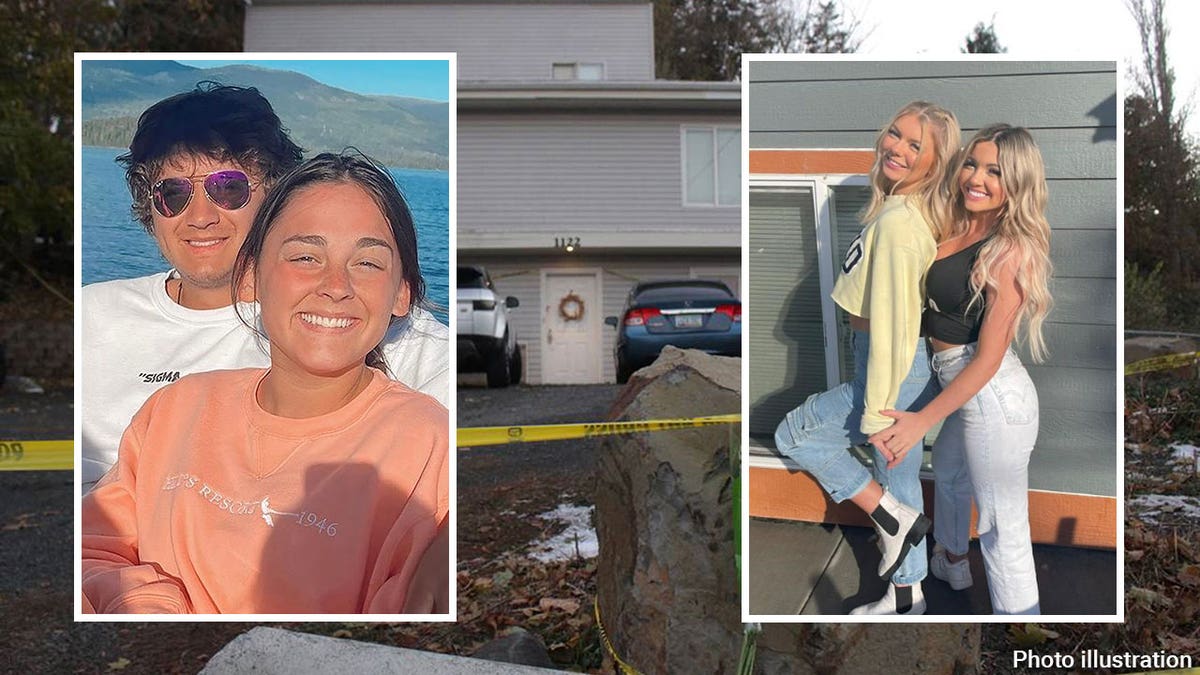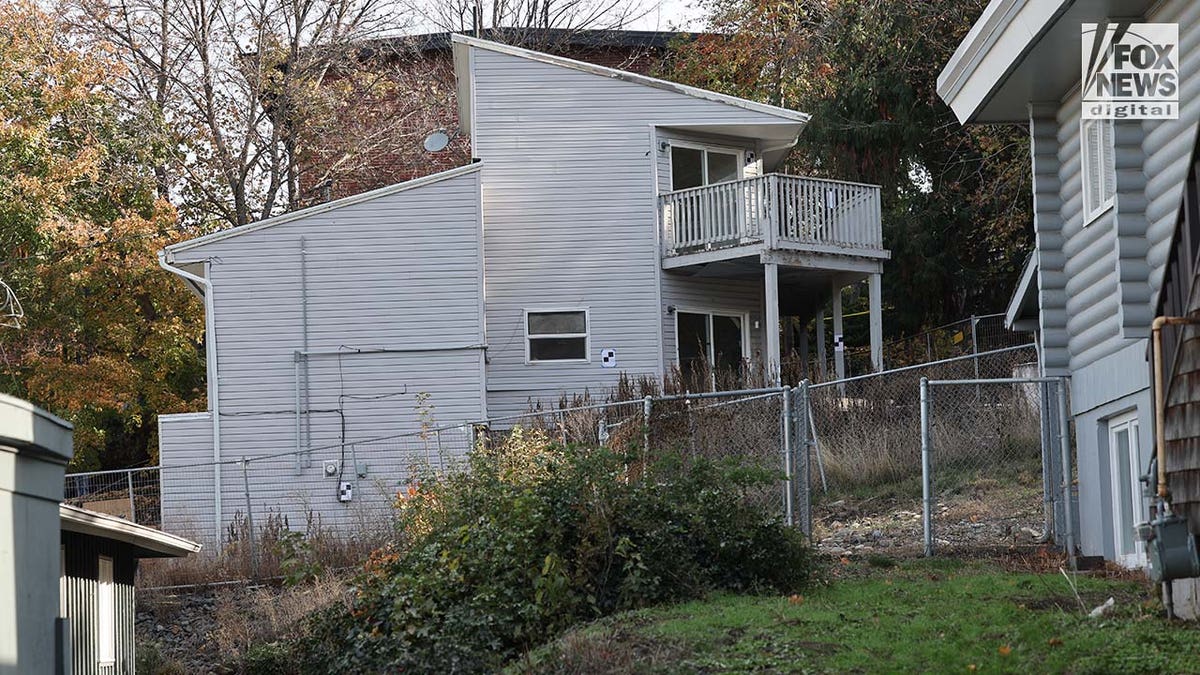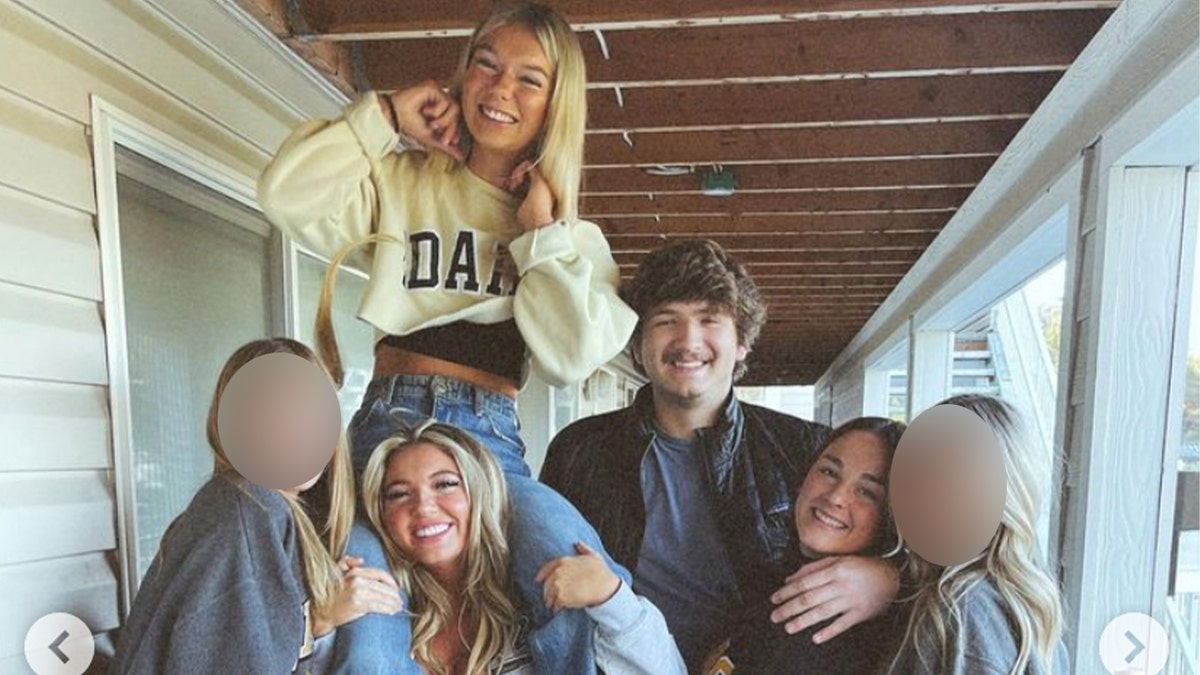Idaho student murders house demolished
Workers demolish the home at 1122 King Road in Moscow, Idaho on Dec. 28, 2023, where four University of Idaho students were killed on Nov. 13, 2022. (Credit: Derek Shook for Fox News Digital)
The University of Idaho on Thursday executed plans to demolish a house near the school's Moscow campus where four students were murdered in November 2022.
Demolition work began in the pre-dawn darkness Thursday as crews used an excavator to rip apart the front of the house at 1122 King Road shortly before 7 a.m. Debris was dumped into trucks and hauled away from the property as construction workers, police officers and university officials watched the scene unfold.
Within two hours, the home had been leveled. By the end of the afternoon, the lot was reduced to a patch of dirt with a fence around it. A memorial with photos, flowers, candles and teddy bears still sits on a rock wall at the front of the property.
The home, just steps from the university campus, became an extensive crime scene last year, when quadruple murder suspect Bryan Kohberger allegedly stabbed roommates Kaylee Goncalves, 21; Madison Mogen, 21; and Xana Kernodle, 20; as well as Kernodle's 20-year-old boyfriend, Ethan Chapin, in their respective bedrooms.
"It is the grim reminder of the heinous act that took place there," University President Scott Green said in a statement. "While we appreciate the emotional connection some family members of the victims may have to this house, it is time for its removal and to allow the collective healing of our community to continue."
The university announced on Dec. 21 that it would be going through with demolition plans during winter break after the house was given to the university last spring. The demolition process could take several days, the school said.
The Goncalves and Kernodle families issued a statement Wednesday evening criticizing plans to move forward with the demolition, saying the physical structure could be significant for Kohberger's pending trial and the jury's understanding of the crime scene and how the events of Nov. 13, 2022, unfolded.
"The Goncalves Family has reached out to the Latah County Prosecutors Office and the University of Idaho to stop this madness," the statement reads.
BRYAN KOHBERGER TRIAL: MOTHER OF IDAHO MURDER VICTIM FIGHTS TO KEEP KING ROAD HOUSE INTACT
They presented questions such as what the two surviving roommates could hear from their respective bedrooms, what pathway Xana Kernodle took when she received a DoorDash order that morning before she was killed, and what the suspect could have seen from outside the King Road house from his car.
"We feel that the University of Idaho and the Court has put us in a horrible position to have to voice our opinions," the families said. "We all along have just wanted the King Rd. Home [sic] to not be demolished until after the trial and for us to have a trial date so that we can look forward to justice being served. Is that really too much to ask? The families would like to thank everyone across the country for your support on this issue and appreciate all of your hopes and prayers!"
BRYAN KOHBERGER TRIAL: IDAHO PROSECUTORS REQUEST PREFERRED DATES, SCHEDULE
The university said in a statement earlier this month that after Kohberger's trial was delayed in the fall, "both prosecution and defense asked for access to the house and have both gone into the house in the last two months."
Latah County Prosecuting Attorney Bill Thompson said in a statement Wednesday that investigators had "no further use of the 1122 King Road premises."
"Based on our review of Idaho case law, the current condition of the premises is so substantially different than at the time of the homicides that a 'jury view' would not be authorized. We appreciate the UI's help in facilitating the investigators gathering the necessary measurements, etc., to enable creation of illustrative exhibits that should be admissible and helpful to the jury," Thompson said.

A split photo showing the crime scene and the victims, including University of Idaho students Ethan Chapin, 20; Xana Kernodle, 20; Madison Mogen, 21; and Kaylee Goncalves, 21. (Angela Palermo/Idaho Statesman/Tribune News Service via Getty Images/Instagram/ @kayleegoncalves)
Former FBI profiler Mary Ellen O'Toole told Fox News Digital that if Kohberger did commit the crime he is accused of, "depending on the legal discussions he has had with legal counsel, there may be a sense of relief that a jury will never be able to access the home and view for themselves how a quadruple murder could have occurred within that structure."
"He now knows that a jury will never be able to see for themselves how thick or not thick the walls were, how one could access and leave the house without being intercepted, if the offender had been in the home before and knew where rooms were located, how easy – or not – it is to hear between the walls, etc," she continued. "Knowing a jury will never see the inside of the house could give BK a sense of relief and even a sense of satisfaction."
At the same time, however, "it could be possible, depending on his personality," that Kohberger "was looking forward to walking with the jury through the Moscow house one final time, when he could relive his crimes," O'Toole said.

Investigators set up outside the home where four University of Idaho students were slain in November last year in Moscow, Idaho, Tuesday, Oct. 31, 2023. The FBI plans on getting documentation to construct visual and audio exhibits and a physical model of the home where Ethan Chapin, Xana Kernodle, Madison Mogen and Kaylee Goncalves were killed. (Derek Shook for Fox News Digital)
Forensic psychologist Dr. Kris Mohandie told Fox News Digital that he thinks the demolition is "good for the victims, and it prevents it from being a morbid attraction or place other like-minded individuals go to connect with their anti-hero."
"It is somewhat consistent with what has happened in other places, like Columbine, where the library was made into a memorial," Mohandie added. "As far as some offenders, it takes away a place they might be able to go to relive and fantasize, if that is their thing."

Madison Mogen, top left, smiles on the shoulders of her best friend, Kaylee Goncalves, as they pose with Ethan Chapin, Xana Kernodle, and two other housemates in Goncalves' final Instagram post, shared the day before the four students were stabbed to death. (@kayleegoncalves/Instagram)
Prosecutors allege that Kohberger, who was a criminology Ph.D. student in Washington, drove from his Pullman, Washington, apartment to Moscow, Idaho, in the early morning hours of Nov. 13, 2022, and stabbed the four victims in their bedrooms. Mogen and Goncalves, who were best friends, were found deceased in the same bed.
GO HERE FOR MORE TRUE CRIME FROM FOX NEWS DIGITAL
He apparently spared two surviving roommates, who were in different bedrooms at the time.
Investigators tied Kohberger to DNA found on a knife sheath left at the crime scene next to Mogen's body. Kohberger allegedly fled Pullman after the crime and traveled cross-country with his father back to his home state of Pennsylvania while police were still piecing evidence together.
CLICK HERE TO GET THE FOX NEWS APP
Pennsylvania State Police and the FBI staked out his family home in the Poconos before they found a familial DNA sample in their trash bin that matched the DNA on the sheath.
Prosecutors also said cellphone and vehicle data tied Kohberger to the crime scene when the murders allegedly took place.
Fox News' Michael Ruiz and Adam Sabes contributed to this report.























